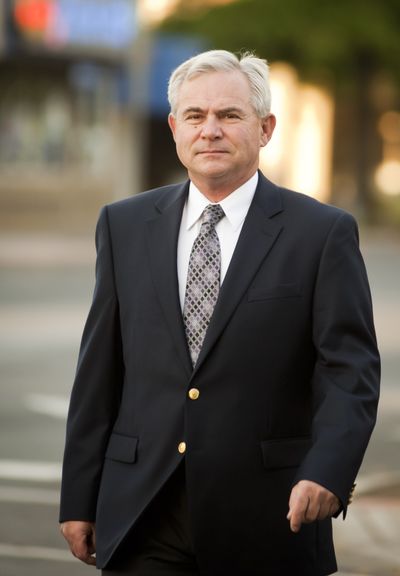Thompson released pending sentencing
Judge cites convicted officer’s military, police service in ruling

A judge ruled late Monday to release convicted Spokane police Officer Karl F. Thompson Jr. and could rule as early as this morning whether to bring in jurors for questioning after a defense attorney raised allegations of juror misconduct.
U.S. District Court Judge Fred Van Sickle reversed a Friday decision by U.S. Magistrate Judge James Hutton, who ordered Thompson detained until sentencing, which has been set for Jan. 27 at 9 a.m. In ruling for Thompson, Van Sickle went against a prior ruling made against officers convicted in the 1992 beating of Rodney King that they were not above the law that requires they remain in jail prior to sentencing except in “exceptional” cases.
“The court is very much mindful that the (Rodney King) case clearly states that there is no law enforcement exemption for law enforcement detention,” said Van Sickle, who presided over the four-week trial in which Thompson was convicted of using excessive force against Otto Zehm and lying to cover up his actions.
In his opening remarks, Van Sickle referenced the public display Friday of about 50 Spokane police officers who stood and saluted as Thompson was led away by U.S. Marshals.
“There are a lot of hard and strong feelings one way or the other,” Van Sickle said. “This is not the place for any form of demonstration or action of any kind or sort. At best, such conduct will carry exclusion from the courtroom. At worst … contempt of court.”
About 15 officers attended Monday as defense attorney Carl Oreskovich pleaded for the release of Thompson, who arrived unshaven wearing a yellow Bonner County Jail jumpsuit that indicated where he spent his weekend.
“I can’t imagine a circumstance where anyone would be more vulnerable in an incarcerated setting than a police officer,” Oreskovich said. “This is a man who for his entire life stood up for what we all believe in and protected what we all believe in.”
And at 64, Oreskovich said his client is facing a sentence that “could be potentially the rest of his life. I would argue that is another exceptional reason for his release pending sentencing.”
Assistant U.S. Attorney Timothy Durkin argued previous court rulings clearly show that only those persons with “truly unusual circumstances” are allowed to remain out of jail while awaiting sentencing after a violent crime conviction.
“Unless this court is willing to say that all officers convicted of (using unreasonable force) are exceptional, then this court must rule that the defendant remain detained,” Durkin said.
Van Sickle cited Thompson’s lifelong service in law enforcement, his “exemplary” military service in the Vietnam War and complying with all conditions of his release prior to his four-week trial in Yakima.
“I’m persuaded that the defendant is not likely to flee … and that he does not pose a risk of harm to any person or the community,” Van Sickle said. “I do think that is an exceptional circumstance that will apply.”
Van Sickle also set a hearing for today at 8:30 a.m. after Oreskovich requested to question jurors who were near a television when coverage of the trial was broadcast.
“What I can do is proffer an observation of myself,” Oreskovich said in court last week, that jurors “were exposed to information they should not have been exposed (to) … about mental health issues.”
However, Oreskovich then filed a memorandum identifying that it was his paralegal, Jodi Dineen, who saw a juror watching a Northwest Cable News television broadcast of a “tickertape” that indicated the jury was deliberating a “Spokane police officer’s beating death of mentally ill janitor.”
Durkin later filed his own memorandum from investigator James Tilley, who contacted Northwest Cable News and obtained the verbatim transcript of that tickertape broadcast. It made no mention of any mental illness of Zehm, which Van Sickle ruled would not be admissible during trial.
In his arguments against opening the jury up for questioning, Durkin cited another case – U.S. v. Williams-Davis – where an attorney waited just like Oreskovich until after the jury’s decision before raising allegations that one or more jurors had been exposed to media accounts of the trial.
“Under such circumstances,” the appellate judges wrote in part, “we think the objection came too late and that the complaining parties should not be permitted to speculate on the result of the trial before calling the question of (juror) misconduct to the attention of the trial court judge.”